|
This section contains 412 words (approx. 2 pages at 300 words per page) |

|
Evolution is the gradual, cumulative change over time of the characteristics of groups of organisms, in a heritable manner. Eventually, these minute changes add up to produce an individual that is markedly different from its distant ancestors, but almost indistinguishable from its most immediate ancestors. These changes are brought about by the organism's genetic response to the environment, and, over the entire course of history, evolution has given rise to all different forms of life on Earth.
Evolution does not occur rapidly on the individual unit of life; changes are too small and slow to be effective at the individual level. In fact, evolution is more efficient at the population level among groups of organisms that are capable of successfully breeding with each other. With organisms that do not breed with other individuals, the rate of evolutionary change is slower than it is among outbreeding organisms.
Evolution leads...
|
This section contains 412 words (approx. 2 pages at 300 words per page) |

|


